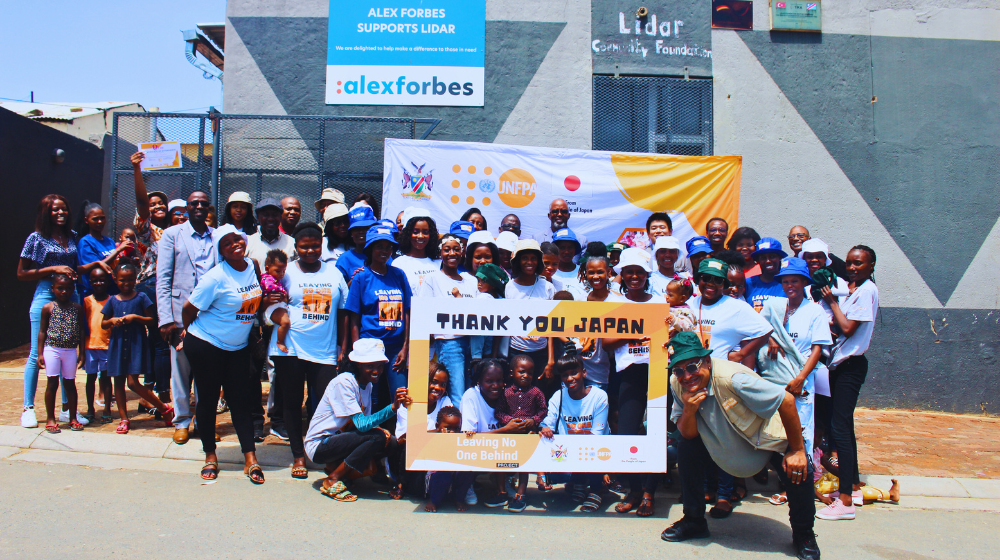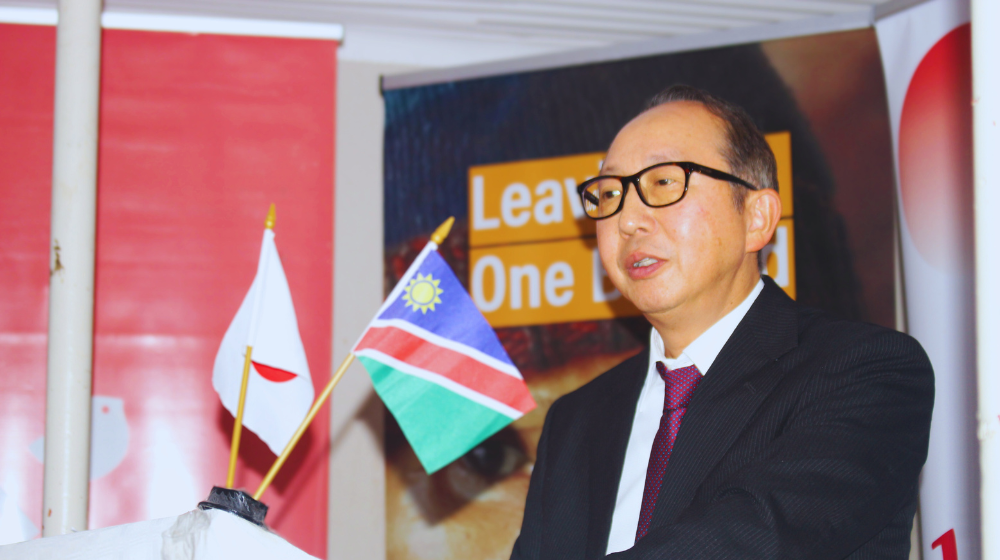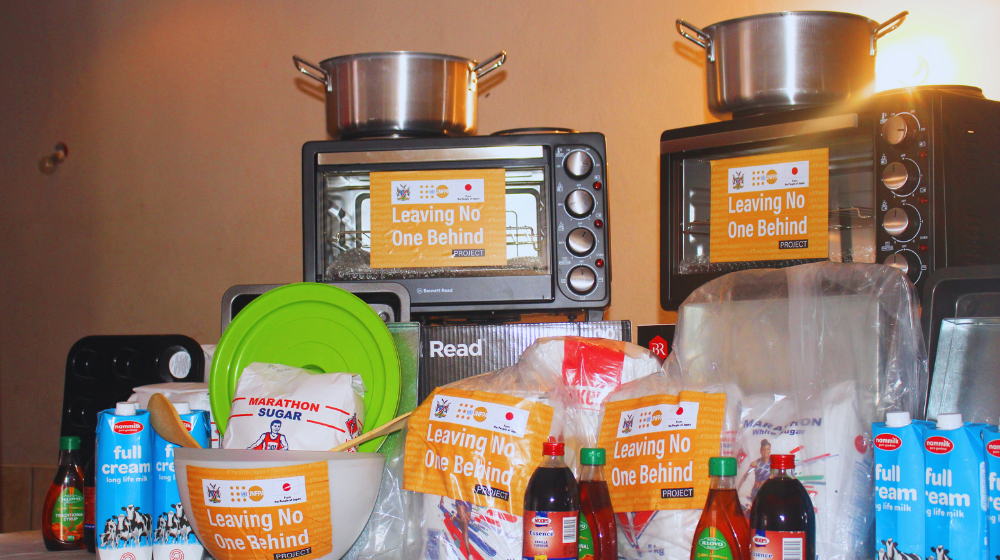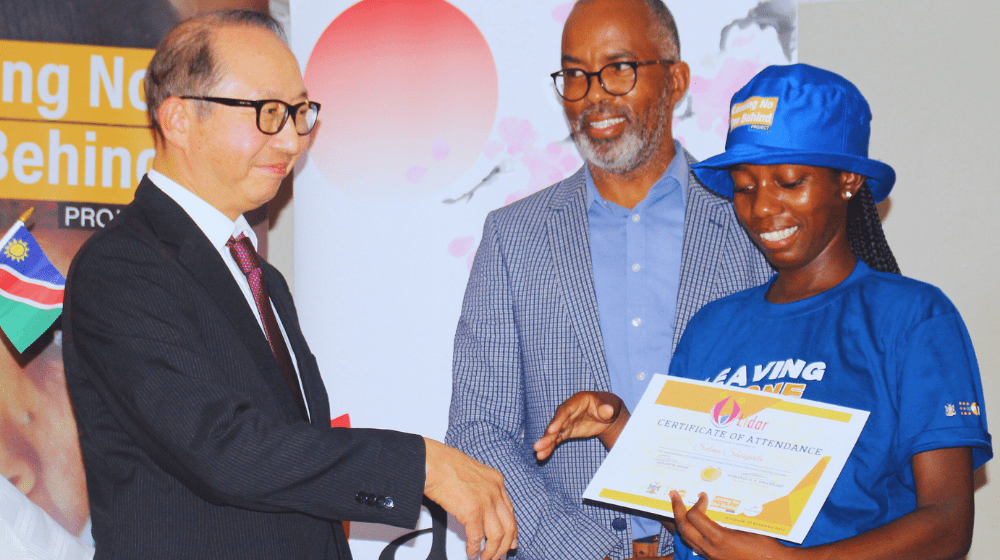
WINDHOEK, Namibia – On 29 November 2023, the United Nations Population Fund (UNFPA), with generous support from the Government of Japan, celebrated the graduation of 40 young mothers after they successfully completed a three-week livelihood training at Lidar Community Centre in Katutura.
As part of the livelihood initiatives under the Government of Japan-supported UNFPA Leaving No One Behind project, the training and graduation were held in collaboration with Regain Trust and Lidar Community Foundation and sought to promote the sexual and reproductive health and rights (SRHR) of young mothers through livelihood skills training and information sharing on gender-based violence (GBV) and SRHR.

Speaking at the graduation ceremony, the Japanese Ambassador to Namibia, His Excellency Hisao Nishimaki, said that “the skills gained during training will contribute to these young people’s resilience to deal with and overcome setbacks that life throws at them by diversifying their livelihood systems.”
The graduation was a milestone moment for the young mothers (who are all under the age of 25), as they are now able to establish their own income-generating businesses with the various skills they have gained in numerous areas, including cooking, baking, housekeeping, entrepreneurship, as well as information on GBV and SRHR.

Approximately 32% of adolescent girls aged 15–19 and 35% of young women aged 20-24 have encountered physical violence from a partner in Namibia. The pervasive impact of gender-based violence on Namibia extends to economic and developmental setbacks, including absenteeism, loss of work days due to illnesses, and hospitalisations with insufficient economic and livelihood opportunities, making women more susceptible to harmful practices such as human trafficking and commercial sexual exploitation.
Thanks to the Government of Japan, the 40 young mothers—most of whom became mothers as teenagers—graduated with starter kits that included a mini oven, mixing bowls, baking trays, baking ingredients, and measuring spoons, providing a strong foundation upon which these women can collectively build their small businesses, thereby improving and enhancing their living conditions and those of their families.
During the official handover of certificates and starter kits, the Japanese Ambassador, H.E. Nishimaki, congratulated the new graduates on their achievements, emphasising that the Government of Japan remains committed to providing assistance to Namibia in the spirit of building resilience and contributing to livelihood upliftment efforts for the people of Namibia.
I hope the tangible outcome of this project will further strengthen Japan-Namibia relations and continue to benefit the people of Namibia.
“I hope the tangible outcome of this project will further strengthen Japan-Namibia relations and continue to benefit the people of Namibia," added H.E. Nishimaki.
Following graduation, the young women were linked with youth-friendly sexual and reproductive health information and services, including contraceptives.
“There's no problem that would not be solved if you have your hands as a woman, and if you have your mind and energy, we can do better things in life. Thanks for changing our lives for the better. We now know we can wake up and empower other young ladies," said Zelda Swartbooi, a mother of three who participated in the three-week training.
Without the support of the Japanese people, this transformative intervention for the young mothers would not have been possible. Zelda’s heartfelt words underscore the tangible impact that investing in the lives of young mothers can have. The training not only equipped young mothers with practical skills but also instilled self-confidence, sisterhood, and a sense of independence in these women. The ripple effect of an empowered mother can go beyond individual lives, contributing to the broader goal of creating a more resilient and empowered community in Namibia.
The Leaving No One Behind project is fully funded by the People and Government of Japan. This project aims to address gender-based violence and negative sexual and reproductive health outcomes in Namibia and is specifically dedicated to reaching those at risk of being left furthest behind, including vulnerable groups such as in- and out-of-school youth, pregnant and lactating women, women and girls facing multiple vulnerabilities, especially those with disabilities, refugees, and other groups at risk of sexual and gender-based violence.
“This program stands as a testament to the generous support of the Government of Japan and its people through UNFPA. We express our sincere gratitude to the Government and People of Japan for your commitment to advancing the well-being and empowerment of the people in Namibia," said UNFPA HIV/Family Planning Programme Specialist Ms. Grace Hidinua, who represented the organisation at the graduation.
UNFPA is the United Nations agency committed to sexual and reproductive health. Collaborating with governments and partners, it strives to eliminate unmet needs for family planning, preventable maternal deaths, gender-based violence, and harmful practices such as child marriage and female genital mutilation. Additionally, it prioritises the regional goal of ending sexual transmission of HIV by the year 2030.


